In Melbourne, Serena Williams has mostly shined, occasionally struggled

Serena Williams is coming off one of the finest seasons in tennis history, in which she captured three of the four major women’s singles titles and fell just short of the first calendar Grand Slam since Steffi Graf’s in 1988. She was later named Sports Illustrated’s 2015 Sportsperson of the Year.
On the cusp of her 22nd Grand Slam singles title, Williams began the 2016 Australian Open with a straight–sets victory over Camila Giorgi. Earlier this month, Williams pulled out of the Hopman Cup on Jan. 6 due to inflammation in her left knee, which is the same injury that kept her out of commission for the final two months of 2015.
Williams has an Open Era-record six titles at Melbourne Park, but she has also experienced her fair share of disappointments in Australia.
With her 2016 Australian Open underway, take a look back at some of Williams's highs and lows in her 15 appearances in the tournament.
• WERTHEIM: Serena dispels doubts with first–round win
2003 semifinal
Williams d. Clijsters 4–6, 6–3, 7–5
In the 2003 Australian Open semifinal, Williams faced fourth-seeded Kim Clijsters, who was one of just five women to defeat her in 2002.
After splitting the first two sets, Williams trailed 5–1 in the third set before rattling off five straight games and saving two match points to take the match 4–6, 6–3, 7–5.
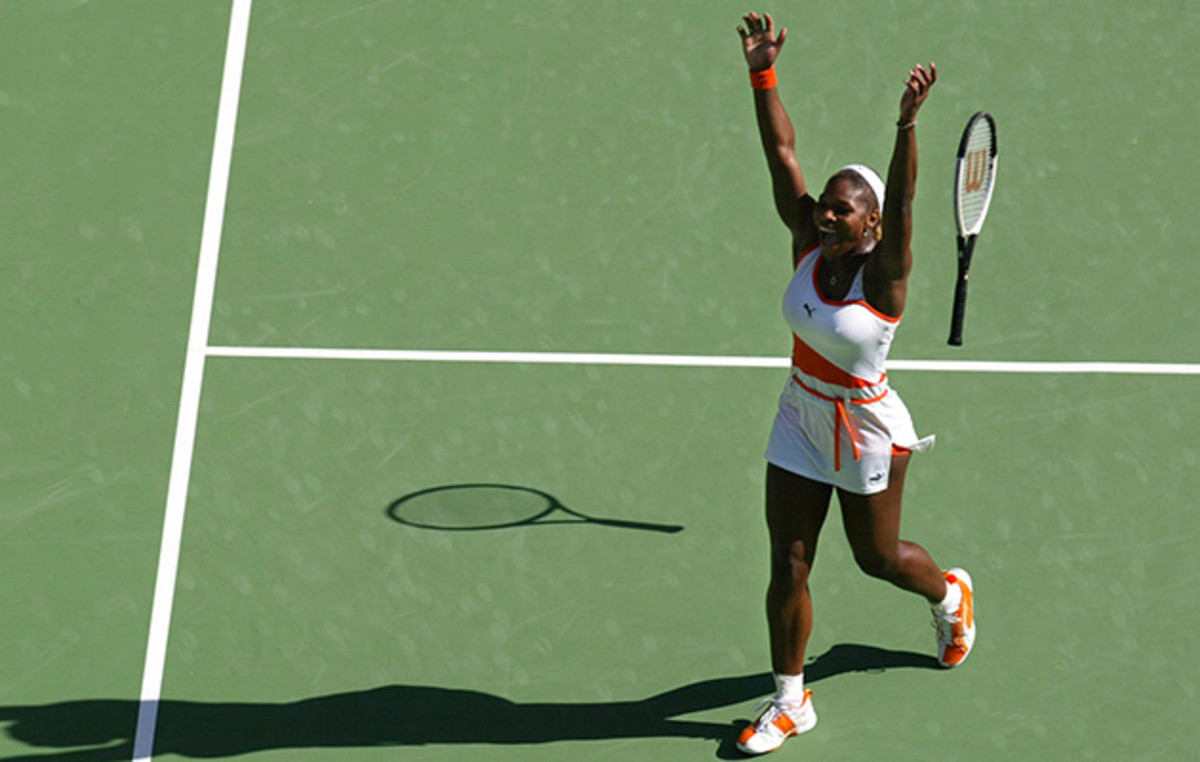
Williams went on to topple sister Venus 7–6 (4), 3–6, 6–4 in the 2003 final for her first Australian Open title.
The title was Williams’s fourth straight, which gave her the first “Serena Slam” of her career. She was the first tennis player since Graf in 1993–94 to win four straight Grand Slam titles.
[youtube:https://www.youtube.com/watch?v=URY3xMrsmBk]
2005 final
Williams d. Davenport 2–6, 6–3, 6–0
In an Australian Open in which she had to face three of the top four seeds in the tournament, Williams was an underdog as the No. 7 seed.
Williams’s final two matches of the 2005 Australian Open were two of her most dramatic ever in Melbourne. Following a semifinal in which she topped new rival Maria Sharapova 2–6, 7–5, 8–6 after being down three match points in the third set, Williams met world No. 1 Lindsay Davenport in the final.
She lost the first set against Davenport 2–6 and took a long injury break, but returned to the court to win 12 of the next 15 games in the match to take the title 2–6, 6–3, 6–0.
The win marked Williams’s first major championship since Wimbledon in 2003, which came just before the death of her oldest sister, Yetunde Price, who was shot and killed in Compton, Calif., in September 2003.
“My sister is here in spirit,” Serena said following the win over Davenport. “I wanted to win this for her. But I wanted to win this for me too.”
The win gave Williams the seventh Grand Slam singles title of her career.
2006 third round
Hantuchova d. Williams 6–1, 7–6 (5)
One year after the 2005 Australian Open, in which she pulled off a series of comebacks to win the second singles title of her career at the tournament, Williams was upset in the third round by 17th seed Daniela Hantuchova.
The Slovakian captured the first set 6–1 after 31 minutes of dominance. Williams, the No. 13 seed, attempted to salvage the match by saving three match points to send the second set into a tiebreak. Hantuchova, however, did not relent, as she eventually clinched the victory and bounced an uninspired Williams from the tournament.
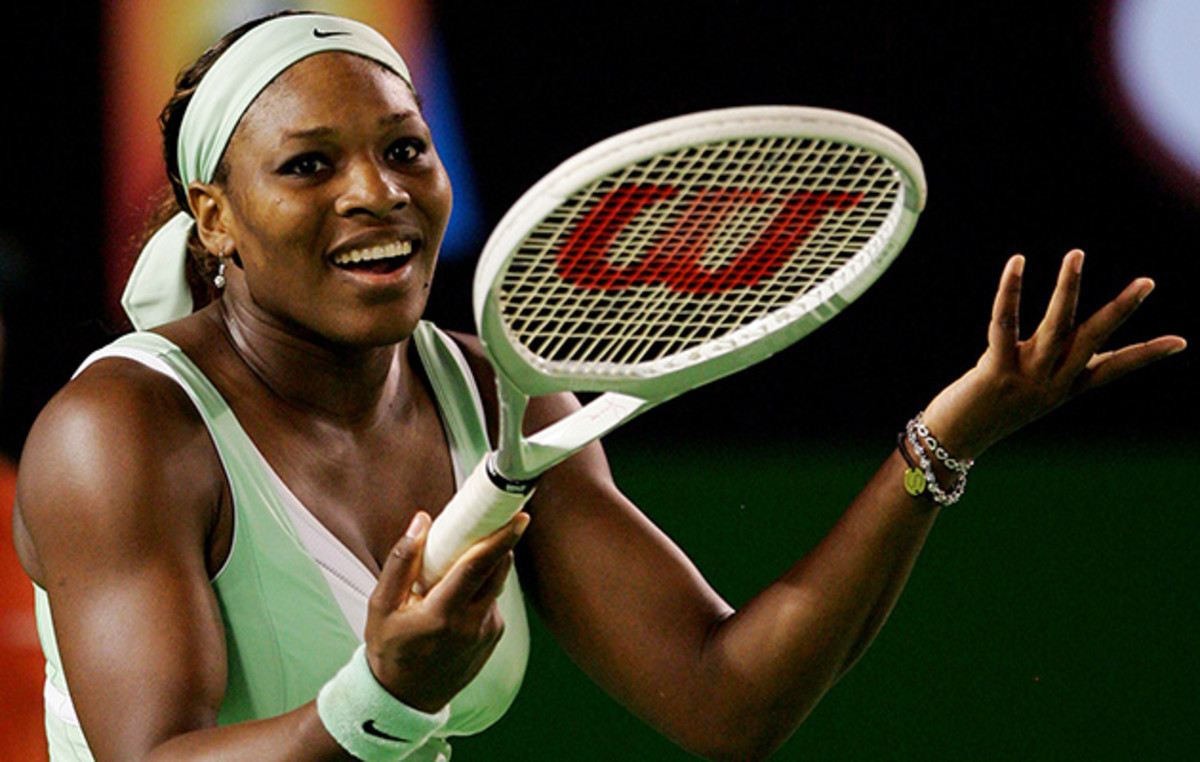
Williams blamed her loss on a lack of training due to a lingering knee injury, which had supposedly kept her off the court. It was later revealed in her biography that she was suffering from depression at the time of the loss and for much of the 2006 season.
Hantuchova went on to lose to fourth-seeded Maria Sharapova in straight sets in the next round.
2007 third round
Williams d. Petrova 1–6, 7–5, 6–3
Unseeded and seemingly out of shape, Williams, who plummeted to No. 140 in the world rankings in July 2006, was ranked an underwhelming world No. 81 at the time of the 2007 Australian Open.
She entered the 2007 Open after missing nine tournaments due to a knee injury and indifference. She had lost in the third round in Melbourne in 2006.
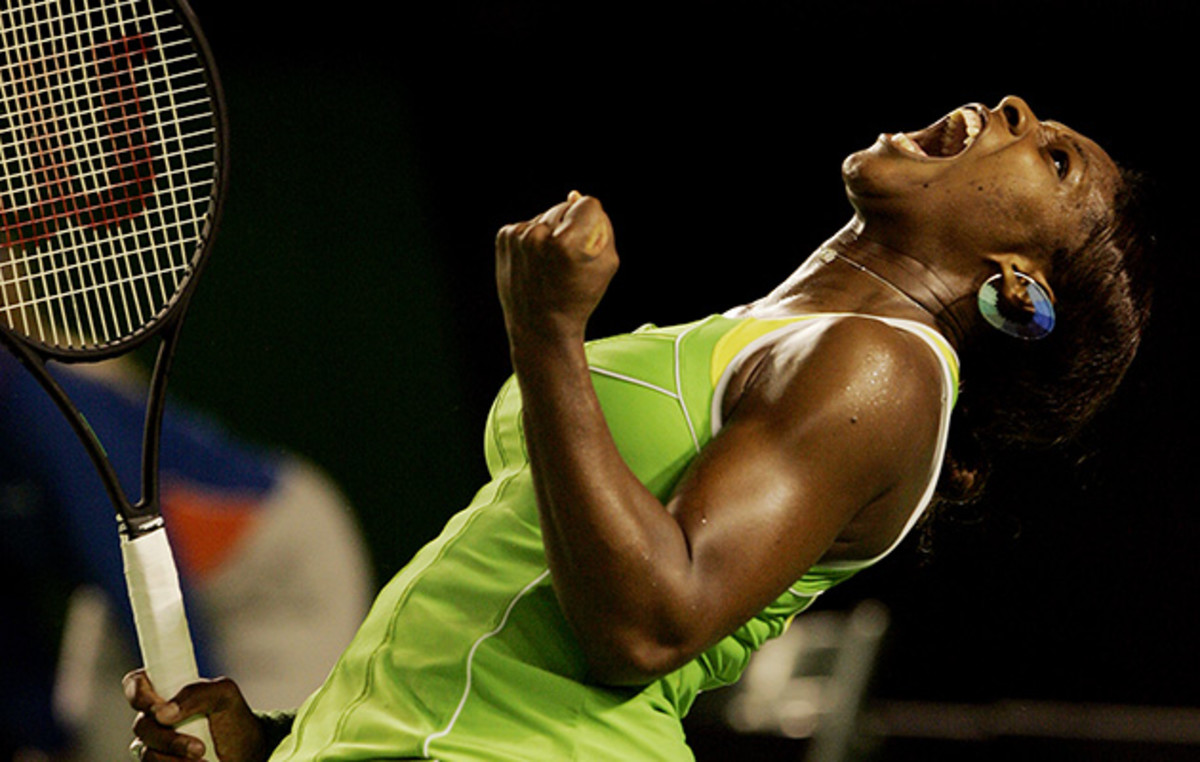
On her way to the most surprising Grand Slam singles title of her career, Williams met No. 5 Nadia Petrova in the third round. She was thrashed by Petrova 1–6 in the first set and faced a 3–5 deficit in the second before breaking back, holding serve and breaking again to take the set 7–5 and send the match to a decider. Williams advanced to the fourth round of the tournament with a 6–3 win in the third set, earning her first victory over a Top 10 player since the 2005 Australian Open.
Williams went on to defeat top-ranked Maria Sharapova 6–1, 6–2 in the tournament’s final to become the first unseeded woman in the Open Era to win the Australian Open since Chris O’Neil in 1978. The win marked Williams's third crown at Melbourne Park and eighth Grand Slam singles title.
2012 fourth round
Makarova d. Williams 6–2, 6–3
After dominating the first three rounds of the tournament despite entering with an ankle injury that had never fully healed, Williams endured the worst statistical loss of her Australian Open career when she fell to world No. 56 Ekaterina Makarova 6–2, 6–3 in the fourth round in 2012.
Williams dropped the match in just one hour and 22 minutes, and won the fewest games of her career in a loss in Melbourne with just five against Makarova. She committed 37 unforced errors and allowed 15 break points, while converting only one of her own.
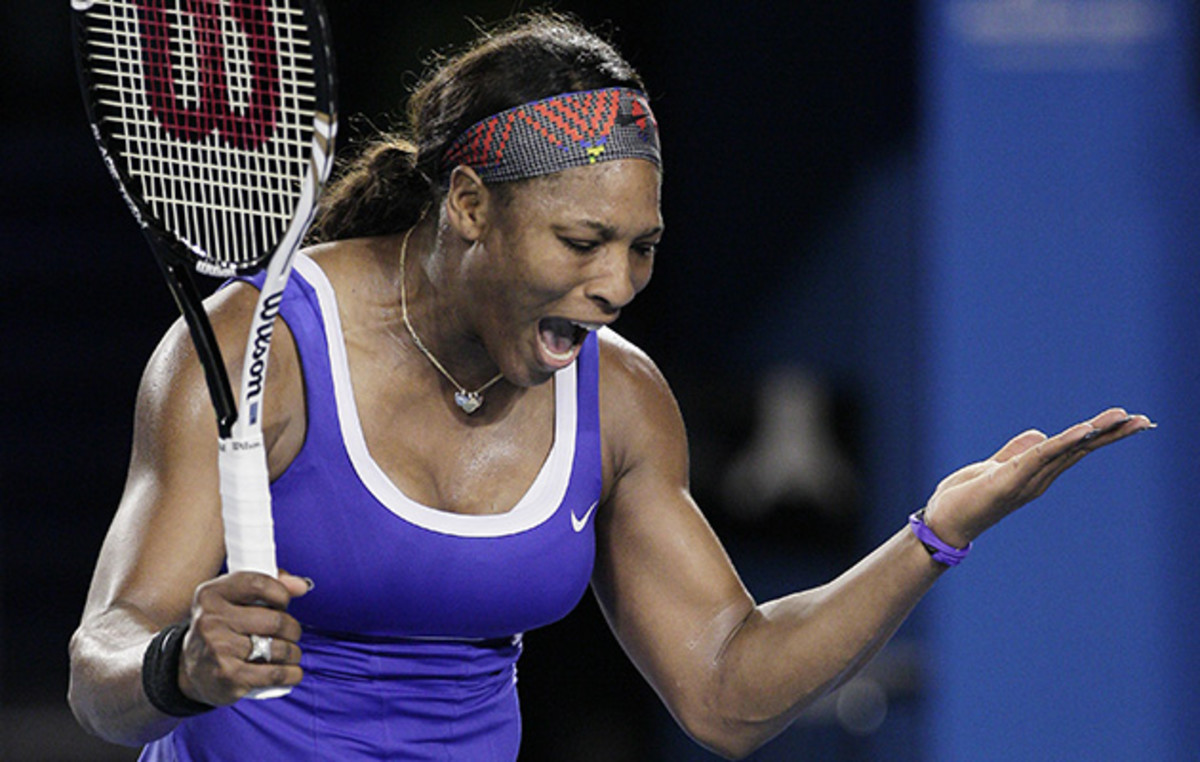
“It was just disastrous,” Williams told reporters following the match. “I served horrendous; that was one of the 50 things [that went wrong].”
Belarus’ Victoria Azarenka was the eventual winner of the 2012 tournament, after defeating Maria Sharapova 6–3, 6–0 in the final.
2013 quarterfinal
Stephens d. Williams 3–6, 7–5, 6–4
Following an eight-month stretch in which she lost just one match and did not drop a set since the 2012 U.S. Open, Williams reached her tipping point during her 2013 Australian Open quarterfinal loss to fellow countrywoman Sloane Stephens.
After taking the first set in just 28 minutes, following victories in her first three service games without dropping a point, Williams looked to be well on her way to dominating the 19-year-old Stephens. Her momentum was thwarted in the second set, however, when she sustained a series of back spasms, and in the midst of her struggles, took out her frustrations on her racquet. She was subsequently fined $1,500 by tournament officials for her actions.
Williams, who also re-aggravated her previously injured right ankle in the second set, could not recover from her injuries and frustrations in the match, and eventually fell to Stephens 3–6, 7–5, 6–4.
2014 fourth round
Ivanovic d. Williams 4–6, 6–3, 6–3
On the heels of a 2013 campaign that saw her win 78 of 82 matches, No. 1 Williams, who was riding a 25-game winning streak at the time, fell to 14th seeded Ana Ivanovic in three sets.
Ivanovic, who had previously lost every set she had played against Williams and won just four games in their four prior matches, advanced to her first Australian Open quarterfinal since 2008. The Serbian player won nine consecutive points on her serve to finish the match.
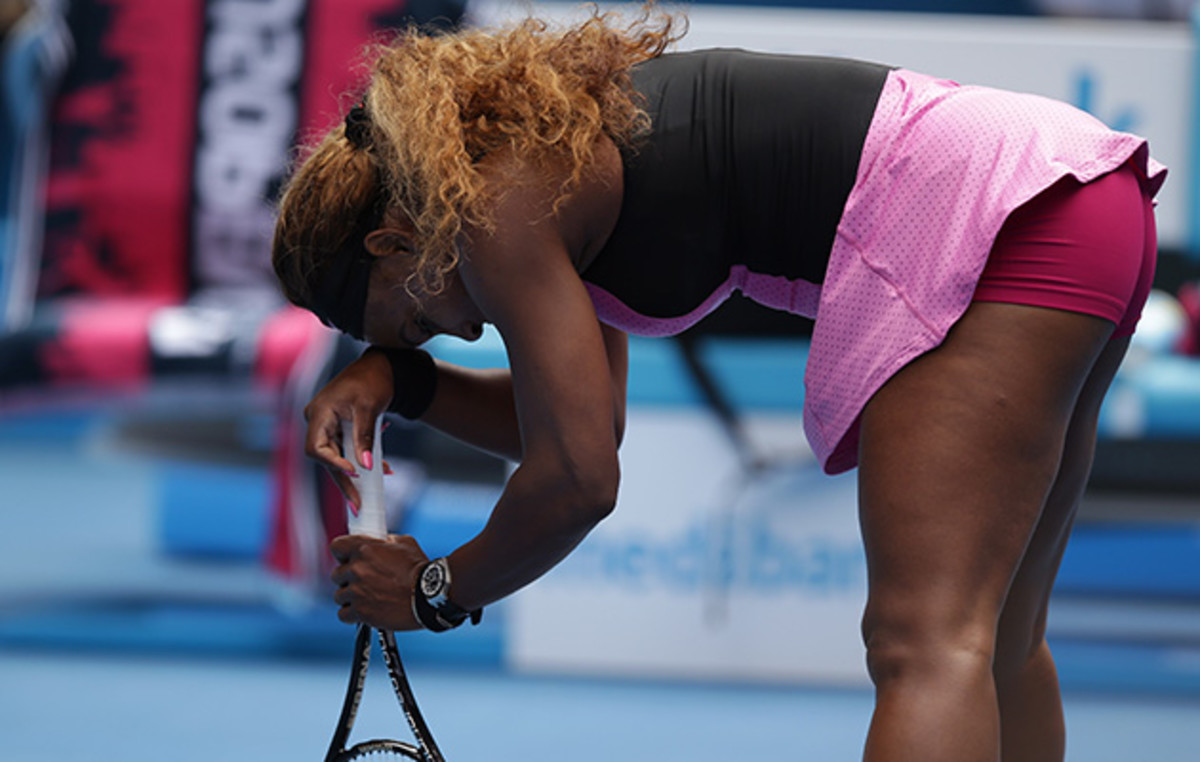
Williams, who at that point had not advanced past the tournament’s quarterfinal round since 2010, later revealed that she was hindered by a back injury she had sustained before her third round matchup against Hantuchova. It was the third straight year Williams left Melbourne with an injury.
Is there something wrong with Serena? She doesn't seem like the same player the last few rounds... #anybodyknow
— Melanie Oudin (@melanie_oudin) January 19, 2014
Feel for Serena now in press conference. How do not lie about an injury, without undercutting achievements of an opponent?
— Jon Wertheim (@jon_wertheim) January 19, 2014
Ivanovic went on to lose to Eugenie Bouchard in the quarterfinal, while Li Na eventually took the 2014 crown with a victory over Dominika Cibulkova in straight sets in the final.
2015 final
Williams d. Sharapova 6–3, 7–6 (5)
Williams bounced back from early tournament struggles and a nagging cough to outlast long-time rival and then-world No. 2 Maria Sharapova 6–3, 7–6 (5) in the final to win her sixth Australian Open title.
Through the initial six rounds of the tournament, Williams faced 31 break points, and she dropped the first set in two of her first four matches. In the last three rounds, however, Williams’s dominance was on full display, as she lost just 21 games and no sets.
Williams ended her final match with 38 winners to her opponent’s 21, and had 18 aces and only 25 unforced errors en route to her 16th straight win over Sharapova and 19th major title, which broke a tie with Chris Evert and Martina Navratilova for second-most Grand Slam singles titles in the Open Era.
The victory also made Williams, then 33, the oldest winner of the Australian Open women’s singles title in the Open Era.
